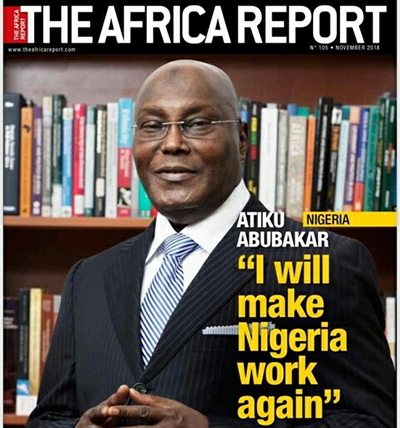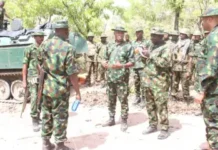Here are excerpts from the chat;
While speaking in an exclusive interview with The Africa Report, the Peoples Democratic Party (PDP) presidential aspirant, Alhaji Atiku Abubakar, who is set to battle President Muhammadu Buhari and others ahead of the 2019 general election, openend up on how he will run his government and make the country a better place, if he emerges victorious.
You have called President Muhammadu Buhari’s economic policy archaic. On what grounds?
It’s not market friendly and because of that we have not been getting much foreign investment. If anything, in fact, we have witnessed a flip of foreign investment out of Nigeria. Many foreign companies have closed shop in this country simply because the wrong economic policies have been implemented.Many foreign companies have closed shop because of the wrong economic policies
You say you would let the naira exchange rate be set by the market. How would you deal with the resulting inflation?
I would prefer to float the naira because I believe that will bring about a more stable exchange rate. Therefore, foreign investors are more likely to return to Nigeria and invest as much as possible. We have to create more incentives for foreign investment and relax conditionalities, remove regulations as much as possible.
In an import-dependent economy, surely that will drive up inflation?
But what you forget, it has two side effects. There could be devaluation and there could be a lot of inflow of foreign currency into the country. The devaluation that is likely to result can be balanced with the relatively huge [sums of] foreign currency that will be coming into the country.
We had that situation prior to the departure of [former president] Goodluck Jonathan. At that time, we had a pile of foreign investment in the country, and there was stability of the naira. So people did not have to go to the central bank to look for foreign exchange because there was foreign exchange in the market and in the banks. So it could turn out to be a win-win situation.
You are calling for restructuring of the federation, which means the oil-producing states will get a bigger share of the revenue. How much?
That will depend on negotiations between them and other parts of Nigeria. But I know they can get more because in the First Republic the regions had 50/50. I don’t mind giving even 100% […], but I would tax those states to maintain the federal government.
You are in favour of giving all the oil-producing states in this country total control over their resources?
For now, it’s not advisable at this stage of our development. Even during the First Republic there was this derivation sharing between revenues and resources, or between the regions and the federal government. So I think we could have a middle course. It would be unfair to ask me for specifics; that will depend on negotiations.
On security, you would give state governments the power to run their own police forces? What would happen if some state governors were to abuse those powers?
I want to devolve policing as well to the states. They’ll be free to run their own police forces. If they cannot, they can come together, two or three states to do it, depending on how they want [to do it].
We have the same thing. The federal government is misusing the police, is misusing the military. So if you are talking of abuse, every level of government abuses.
How would you tackle the clashes between herders and farmers, as well as banditry and cattle-rustling?
In each province in the north, we used to have a grazing reserve. During the season, the cattle are in the reserves. When it is off-season, when farmers would have cultivated all their crops, then the cattle move out to the areas where the farmers have cultivated, allowing the grass in the grazing reserves to grow. These grazing reserves have been abandoned over the years.
One way is to make sure that we give local leaders the power to resolve disputes between farmers and grazers.
What role could economics play in resolving the crisis?
I have decided to set up a factory to produce livestock feeds in each of the zones in the northern states. I have set up one in Yola, one will be completed here in Abuja this December and another one will be done in the north-west. There, you have all types of animal feeds. You can leave your cattle in one spot and buy enough livestock feed and feed your cattle.
You get better meat and more milk. If this business model gets you more income, wouldn’t you go for it? There are cattle rustlers all over. Even in my own herd. I have more than 1,000 heads of cattle, and cattle rustlers came and took over 200 of them and drove away into Cameroon.
Although the Boko Haram militias no longer control swathes of territory, they still launch terror attacks. How would you counter them?
I happen to know how Boko Haram came into being. They were offshoots of political thuggery. Politicians used those boys in Boko Haram to win elections and then abandoned them and then there were no jobs for them. It was the same thing with the Niger Delta. In 1998, I saw it myself and I warned people.
It’s going to be a multifaceted approach. It will involve negotiations. It will involve military action.
Reform of the oil and gas industry has stalled. You have been advocating the wholesale privatisation of the state oil company. Wouldn’t that make things even worse?
Without a stable regulatory framework, the oil and gas companies will find it difficult to invest more in Nigeria. At the time, we pushed for the passage of the new law. We expected that Nigeria would be able to export up to about 4m barrels per day, but here we are still at less than 2m per day.
You’re now saying you would sell the entire state oil company? Or that the government should keep about 10%?
Yes, I would want to go ahead, there is no doubt about that. [The government should have] a very minor shareholding. Nigeria is in dire need of funds to develop its infrastructure and other sectors of the economy.
You criticise the government’s anti-corruption strategy. What would you do differently?
You can’t deploy only punitive measures to fight corruption. One way of trying to reduce corruption to the barest minimum is also to introduce e-governance. If you are applying for a permit, if you are applying for a passport, why not apply online? Why can’t we also employ preventive measures to stop corruption?
What about the grand corruption? Billions of dollars of oil money have been taken from this country.
If we have evidence against you we arrest you and prosecute you, and take away the money.
Are you concerned about the fate of Nnamdi Kanu, the pro-Biafra activist?
I don’t want to be individualistic on this issue. I reject any illegal detention, any detention that is not based on law and order.
What about former national security adviser Sambo Dasuki?
Dasuki is being detained illegally. It is only a court that will say whether he is guilty or not.
Would you favour a referendum for the people of the south-east, offering them the chance to leave the federation?
When we get there. We are going to have a conference to discuss reconstruction. Then we will see. I don’t think there is any part of this country that wants to leave this country. All what they want is fairness, equity and justice.
Are there any situations where where rule of law could be waved aside for national security?
No. The rule of law itself is a guarantor of national security.
Trending Now
NCC launches spectrum roadmap to drive $1tr digital economy
The Nigerian Communications Commission (NCC) has launched its Spectrum Roadmap for 2026–2030, a strategic plan designed to transform the nation’s telecommunications sector and support...
CAF condemn Senegal, Morocco over AFCON final chaos
The Confederation of African Football (CAF) has opened disciplinary proceedings against Senegal and Morocco following a series of controversial incidents that overshadowed the AFCON 2025 final in Rabat.
In a strongly worded statement...
FG opens 2026 overseas scholarships for Nigerian postgraduates
The Federal Government has officially opened applications for the 2026 Petroleum Technology Development Fund (PTDF) Overseas Scholarship Scheme, offering Nigerian postgraduate students the chance...
Army dismisses claims of soldiers’ mutiny over pay
The Nigerian Army has rejected claims circulating in the media that soldiers are threatening mutiny over salaries and allowances, describing such reports as false,...
Power Master: Why itel Power Banks Are the Best and Unstoppable in 2026
In 2026, power is no longer just about battery capacity, it’s about reliability, speed, safety, and convenience. That’s exactly where itel has positioned itself...
Fani-Kayode dismisses ‘misleading’ New York Times report on Sokoto bombing
Nigeria’s Ambassador-designate, Femi Fani-Kayode, on Monday, rejected claims by The New York Times that United States airstrikes in Sokoto State were based on intelligence...
2027: Broadcaster Oriyomi Hamzat joins Accord Party, Oyo governorship race
Popular Oyo State broadcaster, Oriyomi Hamzat, has explained why he is contesting the 2027 governorship election under the Accord Party, saying his decision was...
NCC launches spectrum roadmap to drive $1tr digital economy
The Nigerian Communications Commission (NCC) has launched its Spectrum Roadmap for 2026–2030, a strategic plan designed to transform the nation’s telecommunications sector and support...
FG opens 2026 overseas scholarships for Nigerian postgraduates
The Federal Government has officially opened applications for the 2026 Petroleum Technology Development Fund (PTDF) Overseas Scholarship Scheme, offering Nigerian postgraduate students the chance...
Business
Sports
CAF condemn Senegal, Morocco over AFCON final chaos
The Confederation of African Football (CAF) has opened disciplinary proceedings against Senegal and Morocco following a series of controversial incidents that overshadowed the AFCON 2025 final in Rabat.
In a strongly worded statement...
Entertainment
Bruce Leung, who appeared in Kung Fu Hustle, passes at 77
Veteran Hong Kong martial artist and actor Bruce Leung, also known as Leung Siu-lung, has passed away at the age of 77.
According to reports from Hong Kong media,...


























